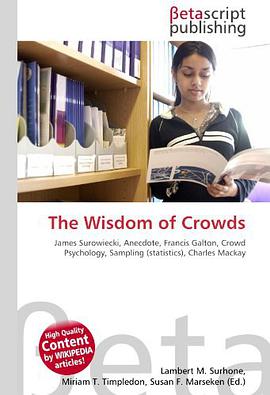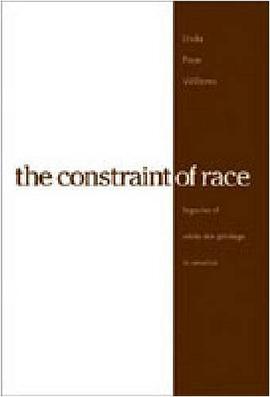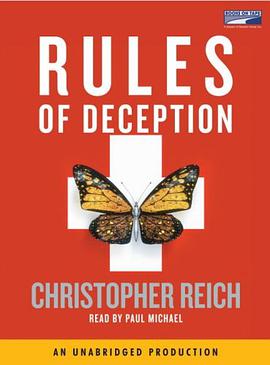

具体描述
While our culture generally trusts experts and distrusts the wisdom of the masses, New Yorker business columnist Surowiecki argues that "under the right circumstances, groups are remarkably intelligent, and are often smarter than the smartest people in them." To support this almost counterintuitive proposition, Surowiecki explores problems involving cognition (we're all trying to identify a correct answer), coordination (we need to synchronize our individual activities with others) and cooperation (we have to act together despite our self-interest). His rubric, then, covers a range of problems, including driving in traffic, competing on TV game shows, maximizing stock market performance, voting for political candidates, navigating busy sidewalks, tracking SARS and designing Internet search engines like Google. If four basic conditions are met, a crowd's "collective intelligence" will produce better outcomes than a small group of experts, Surowiecki says, even if members of the crowd don't know all the facts or choose, individually, to act irrationally. "Wise crowds" need (1) diversity of opinion; (2) independence of members from one another; (3) decentralization; and (4) a good method for aggregating opinions. The diversity brings in different information; independence keeps people from being swayed by a single opinion leader; people's errors balance each other out; and including all opinions guarantees that the results are "smarter" than if a single expert had been in charge. Surowiecki's style is pleasantly informal, a tactical disguise for what might otherwise be rather dense material. He offers a great introduction to applied behavioral economics and game theory.
Copyright © Reed Business Information, a division of Reed Elsevier Inc. All rights reserved.
作者简介
詹姆斯•索罗维基(James Surowiecki)
《纽约客》杂志特约撰稿人。他的文章见诸很多出版物,包括《纽约时报》《华尔街日报》《艺术论坛报》《连线》杂志和《候选人名单》杂志。索罗维基最初在《纽约客》杂志的“金融专版”阐述了群体智慧的思想,回答了美国社会长期以来对群体智慧和团队决策能力的质疑。
目录信息
读后感
不知道是翻译的问题,还是作者的写作方法比较学术。读起来有点不流畅,不过里面的很多例子是非常好的,至于作者的结论总结之类基本没怎么看
评分《The Wisdom of Crowds》是James Surowiecki于2004年写就的,彼时,Web2.0还是新生事物,他还得用猜公牛体重的逸闻趣事、猜豆子的实验来佐证群体智慧的主张。而今,群体智慧的应用则俯拾皆是,不胜枚举:譬如Google的PageRank,Wiki, Imdb的推荐影片和豆瓣的推荐阅读等等。 要...
评分我是在读勒庞的《乌合之众》之后阅读的这本书。在中国的历史上,群体通常是狂热、破坏的代名词,无论是历次的农民运动,各种迷信运动的兴起,群体都在其中扮演着推波助澜的角色。或许,“群氓”这个词能更好的表示这些群体。在互联网成为信息主要扩散渠道的今天,各种大大小小...
评分2003年,在很多的国家和地区同时经历了SARS危机。这是一种很像流感的疾病,但实验显示它不是流感病毒,而是一种新型的病毒和疾病。还没有发现SARS病源之前,人们只能通过 “隔离”的方式对付这种流行病毒。同年的3月15日,世界卫生组织与遍布世界各国和地区的11个研究实验室取...
评分前两天读了《群体的智慧:如何做出最聪明的决策》,看这本书的时候,想到了其他一些书,建议一起阅读——《乌合之众》、《失控》。以下是观点摘录与评论: 群体是一种不依赖于任何组织的有机体,它不但有身份,还有自己的意志。和《失控》的观点一样,群体也会表现出其中任何个...
用户评价
有种穿越时光看过去的人如何群情激昂的感觉。。。。
评分有种穿越时光看过去的人如何群情激昂的感觉。。。。
评分有种穿越时光看过去的人如何群情激昂的感觉。。。。
评分有种穿越时光看过去的人如何群情激昂的感觉。。。。
评分有种穿越时光看过去的人如何群情激昂的感觉。。。。
相关图书
本站所有内容均为互联网搜索引擎提供的公开搜索信息,本站不存储任何数据与内容,任何内容与数据均与本站无关,如有需要请联系相关搜索引擎包括但不限于百度,google,bing,sogou 等
© 2026 book.wenda123.org All Rights Reserved. 图书目录大全 版权所有




















